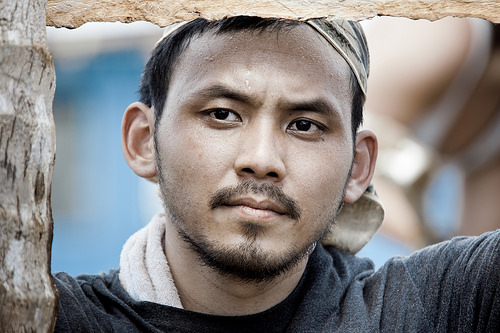Josh Semick, 35, New Jersey, USA
Why did you decide to come here?
Josh Semick:
A couple reasons. First, my wife and I were interested in Earthships. We were turned on by a friend back home. We went up to Ithaca and saw one of them that was built up there. We were actually looking at building one ourselves at some point so we wanted to come out and learn more about the concepts and learn how to build them and just meet the people that are Earthship.
And then at the same time we wanted to come out to the Philippines and help out. Tacloban got hit and we wanted to contribute in our own little way. Also, my wife’s family is out here so it was a kill a bunch of birds with one stone type of thing.
Hui-Chien:
I took some survival courses last year in the States and ran into a bunch of people who have a lot of knowledge about sustainable living styles. I think there should be some kind of combination between the primitive and technology. And then I found the Earthship and I liked the concept. I’m doing industrial engineering work all the time so every theory Michael Reynolds mentioned about the heat exchanging and water recycling totally made sense. I just wanted to see with my own eyes.
Also, just like Josh said, I didn’t come here to just build an Earthship. I came here to help some people. Eventually I think we were actually helped by them. The locals contributed a lot in this project and that’s quite touching.
Hui-Chien Hung, 31, Taipei, Taiwan
Ecologically, why are Earthships so important?
Josh Semick:
They use materials that are sustainable. Not just sustainable, but you’re actually helping out the situation by using stuff that would just be thrown away. Stuff like bottles and cans and tires, things that are easily accessible. Also the passive way that it cools and heats the building. You don’t need a furnace or an AC system, you just use what is provided by the sun and the natural cooling of the earth. All those passive systems are really interesting. The water catchment and all that stuff. Just being as little a drain on the land and energy as possible.
What do your friends think when you talk about Earthships?
Josh Semick:
Oh, most of them aren’t interested. The people I work with are more mainstream, and they don’t understand. They hear something about your house is made out of tires and bottles and they’re turned off by that and they don’t want to listen to you anymore. But that’s fine. It’s one of those things, you’ve got to see it to believe it. Once it gets proliferated a little bit more, and maybe even tweaked, and the concepts refined, you could probably even make it more accessible to more people.
What do you think, Hui? In Taiwan do people think this is just a hippy pipe dream?
Hui-Chien Hung:
Yeah. We are starting to be aware of all kinds of sustainable living styles, but the mainstream still don’t think this works. I think it’s just hard to make people change their mind about what they are used to. They are enjoying the convenience of a centralized system that supplies all their needs. I just think it will change in the future. We will consume less and use materials and resources more wisely.
What are you guys doing right now?
Josh Semick:
We’re making bottle bricks. We’re taking these plastic bottles and cutting them to eight inches, stacking them together, and then we’re going to use them to make walls a little later today.
I think one of the other challenges, one of the biggest hurdles with this, at least where we are in New Jersey, is it’s one of those states that’s really regulated. I think it’d be difficult to get one of these built easily within a township. You’d have to do a lot of convincing and people are initially turned off by that. They’re like, ahh, this is never going to get approved. Why would I buy land and try to build this thing? They’re kind of pessimistic about it.
These are people who actually are excited about Earthships but start going down the path and feel stymied by the status quo?
Josh Semick:
Exactly. And then the other thing is just getting financed. Most people don’t have $250,000 to buy land and build. The issue with the banks, I think that’s a huge hurdle to get these proliferated and into the mainstream.
In Taiwan do they have hurricanes?
Hui-Chien Hung:
Yeah. All the time. We get struck by a typhoon at least three times a year.
And in New Jersey you had Hurricane Sandy not more than about a year ago, right?
Josh Semick:
Just about a year ago, yeah.
This is the prototype of a new version of Earthship. They’ve had the six points that they always try to hit, but this is really a seventh – avoiding destruction so they don’t have to rebuild, and maybe even having a bunker to hide out during the storm. Do you think that’s something that needs to be brought back to New Jersey and Taiwan? Are they building anything similar to this in New Jersey?
Josh Semick:
Not that I know of. They’re just rebuilding the way they’ve always done. Same old buildings. Same old locations. One thing that they’re doing is they’re not rebuilding in flood prone areas, but that floodplain is going to continue to grow. So what do you do? You run out of land cause you’re always in a floodplain. It’s definitely a challenge. The problem is accepting a structure like that. Public opinion on what a structure should look like. And I don’t know that it’s anywhere feasible to do something like this in New Jersey.
What do you think it’s going to take the change the public’s opinion?
Josh Semick:
I think it’s gotta be done over time, little by little. It’s how it’s being done now. You have a couple popping up in different states and then people get interested. ‘Oh, what’s this thing? People are living off the grid?’ They start asking questions and it’s more tangible because they can see it. You just have to roll it out slowly. That’s the only way you can do it. And then people get more and more interested. ‘Oh, what do you mean? I don’t have electric bills? I don’t have to pay for water?’ All the benefits of it start coming out. I think that’s the only way that it can be done.
Be sure to catch the rest of the series!
- Part One: Michael Reynolds, Creator of Earthship Biotecture
- Part Two: Leo, Olav and Zoe, Windship Volunteers
- Part Three: Hui-Chien and Josh, Windship Volunteers
- Part Four: Florian Becquereau, Founder of Earthship Seattle
- Part Five: John Craig, Christina and Hendry, Windship Volunteers
- Part Six: Andrea Roa Buco, Community Activist and Native of Barangay Batug
- Part Seven: Maria Marasigan, Community Organizer and Earthship Activist


